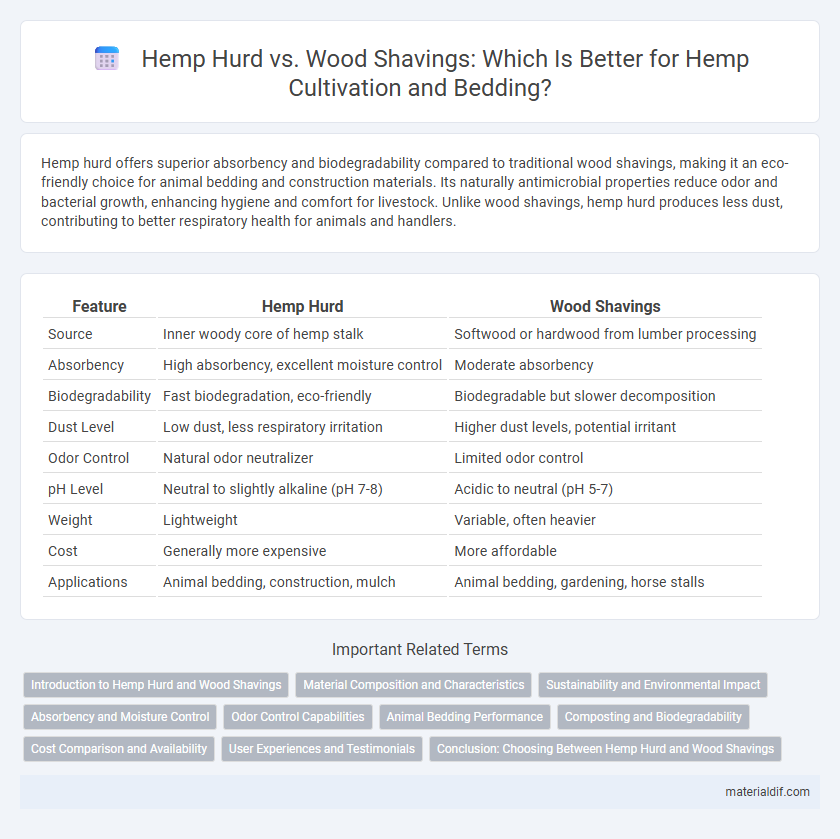Hemp hurd offers superior absorbency and biodegradability compared to traditional wood shavings, making it an eco-friendly choice for animal bedding and construction materials. Its naturally antimicrobial properties reduce odor and bacterial growth, enhancing hygiene and comfort for livestock. Unlike wood shavings, hemp hurd produces less dust, contributing to better respiratory health for animals and handlers.
Table of Comparison
| Feature | Hemp Hurd | Wood Shavings |
|---|---|---|
| Source | Inner woody core of hemp stalk | Softwood or hardwood from lumber processing |
| Absorbency | High absorbency, excellent moisture control | Moderate absorbency |
| Biodegradability | Fast biodegradation, eco-friendly | Biodegradable but slower decomposition |
| Dust Level | Low dust, less respiratory irritation | Higher dust levels, potential irritant |
| Odor Control | Natural odor neutralizer | Limited odor control |
| pH Level | Neutral to slightly alkaline (pH 7-8) | Acidic to neutral (pH 5-7) |
| Weight | Lightweight | Variable, often heavier |
| Cost | Generally more expensive | More affordable |
| Applications | Animal bedding, construction, mulch | Animal bedding, gardening, horse stalls |
Introduction to Hemp Hurd and Wood Shavings
Hemp hurd, the woody inner core of the hemp stalk, offers superior absorbency and biodegradability compared to traditional wood shavings, making it ideal for animal bedding and construction materials. Rich in cellulose, hemp hurd is lightweight yet durable, providing enhanced moisture regulation and odor control. Wood shavings, derived from softwood trees, are commonly used but lack the sustainability and rapid decomposition properties inherent to hemp hurd.
Material Composition and Characteristics
Hemp hurd consists primarily of the woody inner core of the hemp stalk, featuring a lightweight, porous structure with high absorbency and excellent insulation properties, while wood shavings are derived from softwood or hardwood, denser and less porous with variable moisture retention. The cellulose, hemicellulose, and lignin content in hemp hurd contribute to its biodegradability and resistance to pests, contrasting with wood shavings that may contain higher resin levels affecting durability and odor. Hemp hurd's consistency and eco-friendly characteristics make it favorable for sustainable construction and animal bedding, surpassing traditional wood shavings in renewability and environmental impact.
Sustainability and Environmental Impact
Hemp hurd demonstrates superior sustainability compared to wood shavings due to its rapid growth cycle and minimal resource requirements, promoting a lower carbon footprint. Its biodegradability and ability to sequester carbon during cultivation reduce environmental impact, while wood shavings often involve deforestation and slower regeneration. Hemp hurd's natural pest resistance and low water usage further enhance its eco-friendly profile in comparison to traditional wood-based materials.
Absorbency and Moisture Control
Hemp hurd outperforms wood shavings in absorbency due to its highly porous structure, enabling it to retain moisture efficiently while remaining dry. This enhanced moisture control reduces the risk of mold and odors, making hemp hurd ideal for animal bedding and construction insulation. Its superior absorption capacity contributes to healthier environments by maintaining balanced humidity levels.
Odor Control Capabilities
Hemp hurd exhibits superior odor control capabilities compared to wood shavings due to its high lignin content, which naturally absorbs and neutralizes unpleasant smells. The porous structure of hemp hurd enables better air circulation and moisture regulation, reducing ammonia buildup commonly found in animal bedding. Wood shavings often retain odors longer as their denser composition hinders effective absorption and airflow.
Animal Bedding Performance
Hemp hurd offers superior absorbency and odor control compared to wood shavings, making it an ideal choice for animal bedding. Its natural antifungal and antibacterial properties reduce the risk of respiratory issues and infections in livestock. Hemp bedding is also more biodegradable and dust-free, promoting a healthier environment for both animals and handlers.
Composting and Biodegradability
Hemp hurd decomposes faster than wood shavings due to its higher cellulose content and lower lignin levels, enhancing composting efficiency and nutrient availability. Its porous structure promotes better aeration and moisture retention, accelerating microbial activity during biodegradation. Unlike wood shavings, hemp hurd produces minimal acidic residues, resulting in a more balanced compost pH conducive to plant growth.
Cost Comparison and Availability
Hemp hurd is generally more cost-effective than wood shavings due to its rapid renewability and lower processing expenses, making it a sustainable option for animal bedding and construction materials. Wood shavings can be pricier because of higher demand in multiple industries and longer production cycles tied to forestry constraints. Availability of hemp hurd is increasing as hemp cultivation expands globally, while wood shavings remain subject to fluctuations in timber harvesting and seasonal supply limitations.
User Experiences and Testimonials
Users report that hemp hurd offers superior absorbency and reduces odors more effectively than wood shavings, enhancing comfort for pets and livestock. Many testimonials highlight hemp hurd's biodegradability and reduced dust levels, which contribute to better respiratory health and easier cleaning. Compared to wood shavings, hemp hurd is praised for its sustainability and longer-lasting freshness, making it a preferred bedding choice.
Conclusion: Choosing Between Hemp Hurd and Wood Shavings
Hemp hurd offers superior absorbency, biodegradability, and pest resistance compared to traditional wood shavings, making it an environmentally sustainable choice for bedding and mulching. Wood shavings, while often more affordable and readily available, may harbor chemicals or oils that can affect animal health and soil quality. Selecting between hemp hurd and wood shavings depends on specific needs for sustainability, absorption capacity, and potential health impacts in agricultural or animal care applications.
hemp hurd vs wood shavings Infographic

 materialdif.com
materialdif.com